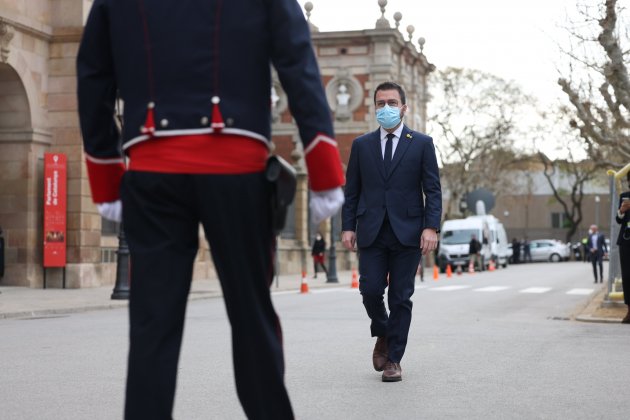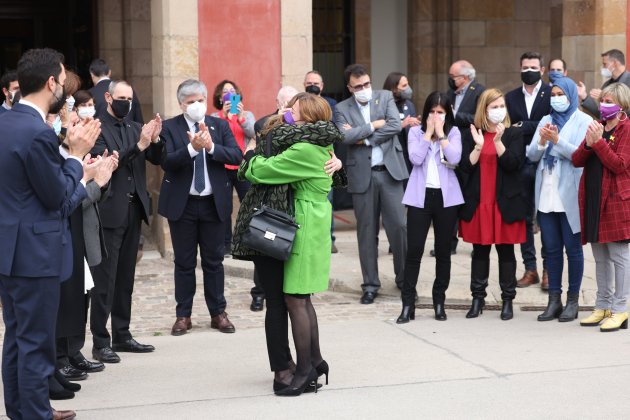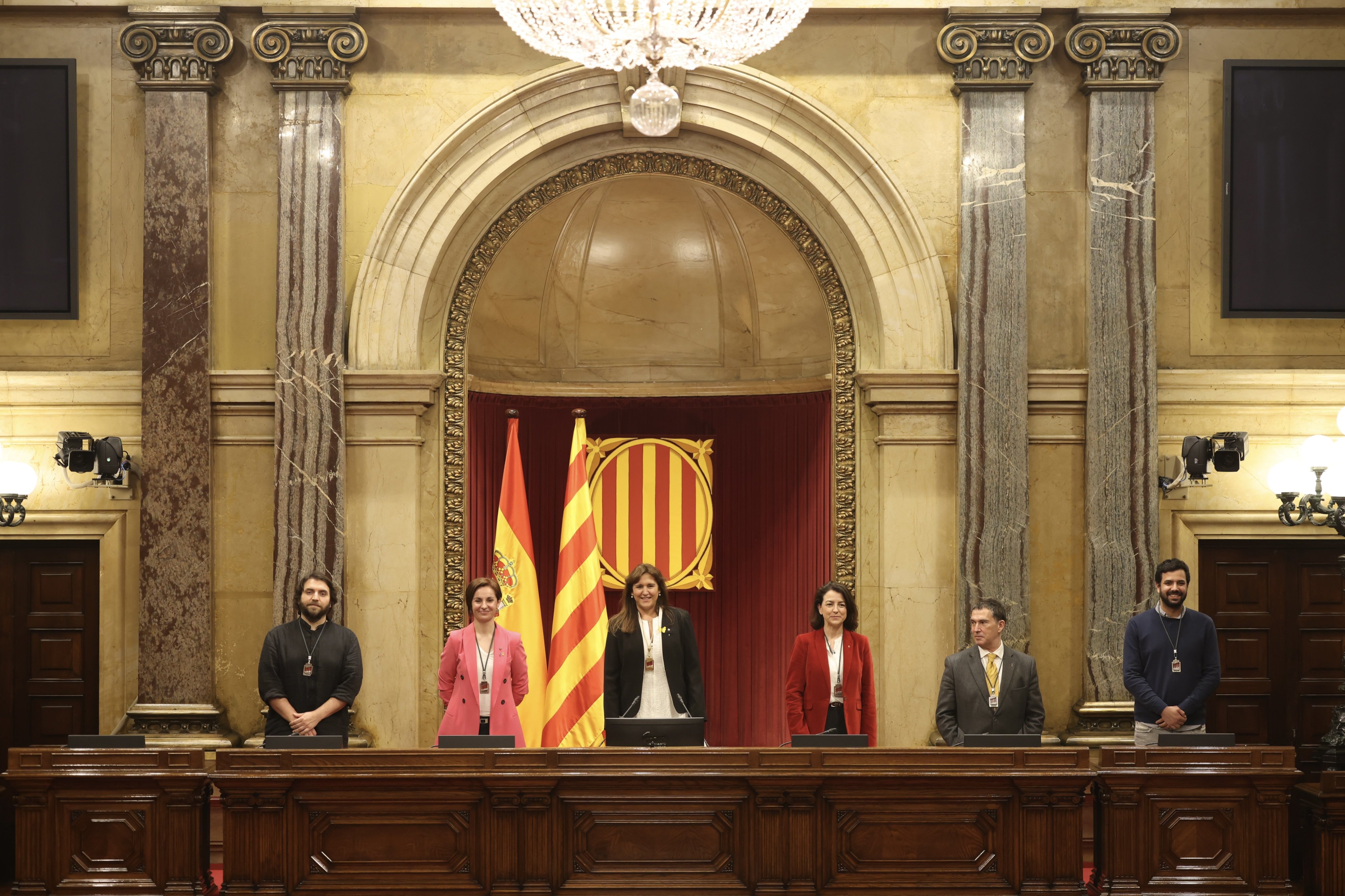A triple pro-independence victory in the constitutent session for the new Parliament of Catalonia: the bloc supporting Catalan independence will control the speaker, the majority in Parliament's procedural organ, the Bureau, and even an extra, unexpected seat in that body. As expected, the negotiations between Republican Left (ERC), Together for Catalonia (Junts) and the Popular Unity Candidature (CUP) have not been free of internal disputes and mutual criticisms. However, while they have dragged on all the way to their time limit, they have borne fruit.
Of the seven seats in the Bureau (the speaker, two deputy speakers and four secretaries) five will be for MPs from pro-independence forces and the Catalan Socialists (PSC) will occupy the remaining two. Junts will have two members, the speaker Laura Borràs and the second secretary Jaume Alonso Cuevillas. ERC another two, the first deputy speaker, which has been won by Anna Caula, and the fourth secretariat, by Ruben Wagensberg. For the first time in history, the CUP will also have a position, specifically the third secretary, which will be held by Pau Juvillà, who was absent today in Covid quarantine after being in contact with an infected person. The Socialists will hold the second deputy speakership, with the position going to Eva Granados, as well as the second secretary, Ferran Pedret.
ERC had risked one of its two seats on the Bureau to ensure that the anti-capitalist party could enter. In the end, the operation paid off: with help from the blockade by most parliamentary parties aimed at isolating the far-right discourse of Vox, the Republicans didn't lose specific weight in the key parliamentary organ. Contrary to what had been speculated, En Comú Podem did not coordinate voting with the PSC and the parties of the right to keep the seat out of pro-independence hands.
Next, to form a government
The concessions which ERC has made to Junts and CUP over the positions decided today are, of course, motivated by a greater goal, which is to be able to invest Pere Aragonès as president of the Generalitat of Catalonia. The agreement reached today paves the way for the investiture, but much work remains to be done, especially to rebuild the trust lost between the partners during the previous government. The coldness with which disqualified president Quim Torra and current acting leader Aragonès greeted each other at the end of the session in the auditorium spoke for itself.

Aragonés reviews the Mossos d'Esquadra police corps, in ceremonial uniform, on his arrival at Parliament. / Sergi Alcazar
The ERC group believes that from the agreements reached with Junts now, their rivals in Carles Puigdemont's party have committed themselves to vote in favour of the Republican candidate. As in previous legislatures, however, the key is the CUP, because ERC and Junts alone do not have a majority. The anti-capitalists are still at the negotiating table, but have undergone something of a burn-out in this first phase, making accusations against the other two pro-independence players of allowing the talks to go nowhere.
CUP demands details, on the roadmap for the legislature, but also in terms of their specific demands to ban the police use of foam projectiles, and withdraw the BRIMO riot squad from use in home evictions. ERC and Junts want to transfer the debate to a parliamentary committee, but the CUP demands an immediate response.
Today's vote also suggests a possible narrowing of the "broad path" which ERC advocated, seeking to bring the Comuns into a government with the three pro-independence groups.
Having got over the obstacle of constituting Parliament, the next deadline is March 26th, the last day possible for an investiture vote. Over the next few days, Borràs will open a round of contacts with the parliamentary groups and convene the first investiture plenary in no more than a fortnight. If Aragonès is not elected in the first or second ballot, there will be a two month period during which another vote will be possible. If it fails, the election will have to be repeated.
The return of Serret
The new speaker of the Catalan chamber had to share some of the prominence today, with Meritxell Serret. The ex-minister in the Carles Puigdemont government has returned to Parliament three and a half years later, to take the seat she won by her presence on the ERC list. She surprised many - even some of her fellow party members - by appearing this Thursday at the Supreme Court in Madrid, to regularize her situation as a defendant in the macro-case of the pro-independence leaders.

Serret and Forcadell share an intense hug at the doors of Parliament. / Sergi Alcazar
On arrival at the building she was greeted with applause by her colleagues, who were joined by representatives of some other parliamentary groups. Just outside the doors of Parliament, Serret encountered former speaker Carme Forcadell, who unlike the seven male political prisoners, has been able to continue an open prison regime. The embrace between the exile Serret and prisoner Forcadell, former parliamentary colleagues who have not seen each other since October 2017, was full of emotion.
Serret is pending a trial for disobedience and misuse of funds. Because the second of these alleged offences failed to bring conviction in 2019 to three fellow ministers who have an identical situation to hers, the chance that she will end up in jail is reduced. Of course, she will have to face a trial for disobedience, which could end up disqualifying her from her current MP role.
"Carrizosa, why do you ask to speak?"
Under parliamentary regulations, the constitution of Parliament is chaired by the oldest member in the house, and once again that distinction is held by Ernest Maragall. The ERC politician took the opportunity to address a few words to other parliamentarians. To begin with, by welcoming Meritxell Serret.
Maragall's first words were too much, in the eyes of the Ciudadanos leader Carlos Carrizosa, who called a point of order to denounce that the chairman was overstepping the "strict protocol function" of his role, and was excluding "the majority of Catalans". The chair tried to reassure him, asserting that when he listened to the whole speech he would end up changing his mind. But as expected, he didn't.
Maragall spoke of political prisoners and of exiles, questioned whether Spain is a full democracy, criticized the "madness" of the courts in their pursuit of independence supporters and movement leaders, and pledged to fight the far right.
Immediately afterwards, Carrizosa raised his finger again. "Your discourse does not accord with what most Catalans think," he warned. "There are no political prisoners or exiles, there are convicts and fugitives."
The Catalan Parliament's thirteenth legislature is on its way. We'll see if, contrary to what has happened in recent years, it lasts the four years for which it has a mandate.
In the main image, six of the seven members of the Bureau. / Sergi Alcazar

